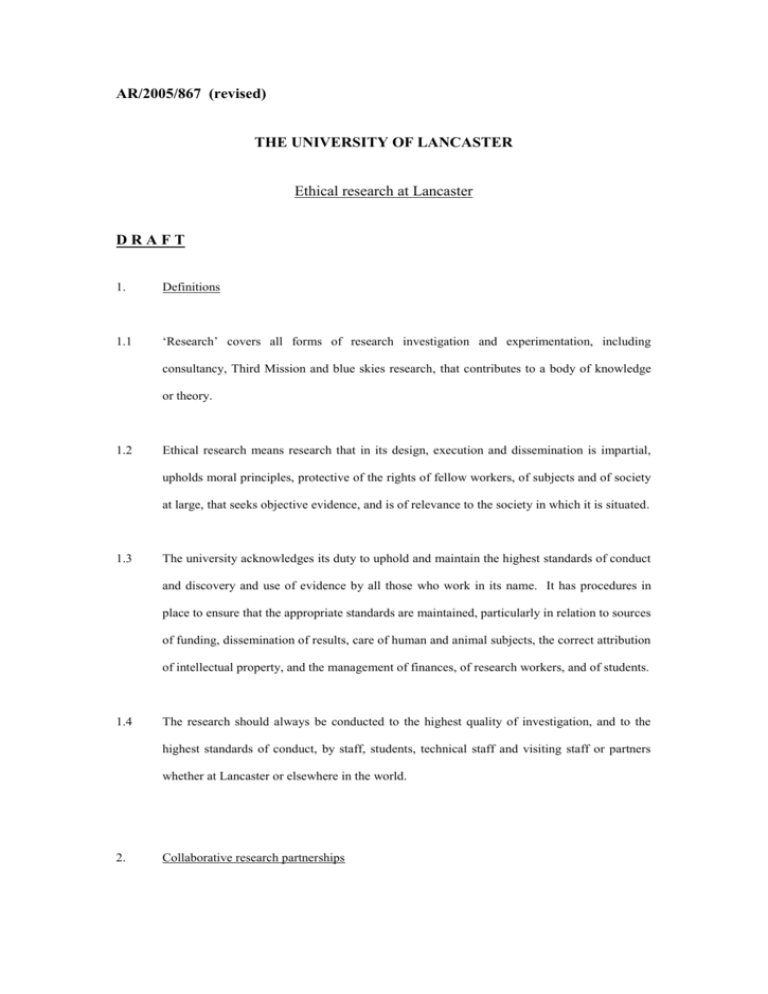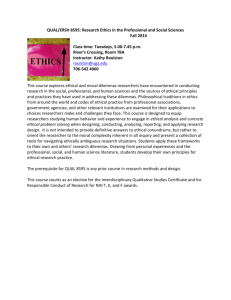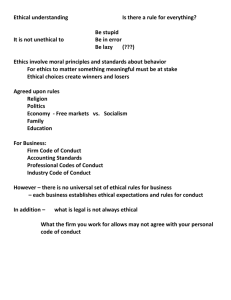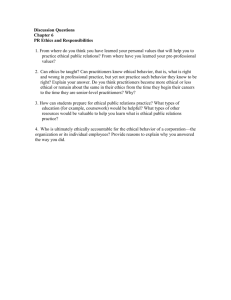AR-2005-867-ethical
advertisement

AR/2005/867 (revised) THE UNIVERSITY OF LANCASTER Ethical research at Lancaster DRAFT 1. Definitions 1.1 ‘Research’ covers all forms of research investigation and experimentation, including consultancy, Third Mission and blue skies research, that contributes to a body of knowledge or theory. 1.2 Ethical research means research that in its design, execution and dissemination is impartial, upholds moral principles, protective of the rights of fellow workers, of subjects and of society at large, that seeks objective evidence, and is of relevance to the society in which it is situated. 1.3 The university acknowledges its duty to uphold and maintain the highest standards of conduct and discovery and use of evidence by all those who work in its name. It has procedures in place to ensure that the appropriate standards are maintained, particularly in relation to sources of funding, dissemination of results, care of human and animal subjects, the correct attribution of intellectual property, and the management of finances, of research workers, and of students. 1.4 The research should always be conducted to the highest quality of investigation, and to the highest standards of conduct, by staff, students, technical staff and visiting staff or partners whether at Lancaster or elsewhere in the world. 2. Collaborative research partnerships 2.1 Partnerships are welcomed between researchers locally, nationally and internationally, provided that: (a) all members of the partnership and all others involved, including students, adhere to codes of ethical practice as laid down by member institutions, including Lancaster; (b) members and other workers shall receive no personal benefits from the research other than those stated in the agreed research proposal; (c) funding from any source that is likely to be controversial shall be carefully considered by members of staff, and the appropriate officers and bodies within their institution, prior to entering into any contract or other agreement. The alternatives are that the funding may be approved, or not approved, or approved with conditions; (d) potential conflicts of interest for any participant in the research shall be identified in advance and resolved. If further or other conflicts arise during the course of the research, they shall be brought to the attention of the parent institution(s) forthwith for resolution; (e) the rights of human and animal subjects shall be safeguarded by conditions that are stipulated in advance; (f) the management of the intellectual property shall be the subject of a separate standing group where the project is substantial; or the responsibility of the principal investigator in terms agreed prior to the commencement of the research in smallerscale projects. 2.2 Researchers who are considering entry into a research partnership should evaluate the following: (a) the potential impact of commercial funding on the university’s reputation for academic autonomy and impartiality; (b) the match between the ethical code of the potential partner, whether commercial, governmental or international, with that of the university; (c) the potential impact of collaborating with a partner that has connections, whether direct or indirect, with human rights abuses; (d) the potential for conflicts of interest, whether of policy, finance or reputation. If the above evaluation raises issues for resolution by the researcher, he/she must consult the appropriate university officer(s) prior to making a commitment to a partnership, including to any informal undertakings. 3. Ethical behaviour: general guidance 3.1 Ethical behaviour includes openness of information about the methodology and findings, except on occasions when the funder or sponsor of the research lays down further conditions about dissemination to which the researcher and his/her institution can give their assent in advance. 3.2 The principal investigators have a key stake in maintaining ethical conduct in their own research and in that of staff and students in their charge, including discipline-specific expertise and judgement of what is ethically appropriate in the field concerned. 3.3 There shall be a clear structure for the ethical conduct of research within the institution, from the most junior researcher to the pro-vice-chancellor for research, in order that there are clear lines of accountability throughout the institution. 3.4 The research undertaken must be lawful, must comply with national and international legislation, and should seek to comply with all relevant national and international codes of ethical practice, where relevant, including those of the EU. 3.5 The dissemination of the research findings must be transparent and open to peer review and public comment where applicable. The findings must be presented honestly, accurately, should avoid, by omission or other means, the withholding of any material information, and should wherever possible be made accessible to non-specialists. 3.6 Agreement by staff to enter into confidentiality clauses in whole or in part should be given only where strictly necessary; for example when commercial, security or personal data are involved, should be time-limited, and should not lead to damage to the careers or lives of research workers or research participants. 4. Research malpractice 4.1 The university, while anticipating that all its members will act ethically, nevertheless has safeguards in place for use in the event of alleged or actual research malpractice, and to prevent corrupt practices and professional mis-conduct. 4.2 Statute 22, Complaints and Disclosures, in conjunction with the procedures set out in Ordinance 8, give safeguards to employees of the university who make a complaint or disclosure, including in matters relating to research. 4.3 In addition to 4.2, the Senate has approved specific guidelines for the treatment of alleged staff plagiarism (S.2005/78). 4.4 There is a Research Ethics Committee, reporting to the Research Committee, whose remit includes a responsibility to consider issues of privacy, confidentiality and ethical behaviour between researchers and human subjects, of the inadvertent disclosure of information about illegal activities, and on the ethical responsibilities of the university’s researchers, including where there are flaws in procedures or practice. The university is committed to bringing active external members onto the committee, to ensure that there is external verification of the university’s procedures and practices. 4.5 The three faculties each has a research committee, that takes responsibility for faculty-specific issues, including by the publication of codes of conduct and the monitoring of adherence to them. The faculty committees, through the associate deans for research, have access to the Research Ethics Committee for guidance on policy or on any other matters that are causing significant concern, and give guidance on specific items referred to them. 5. Responsibility for others 5.1 Research shall not be undertaken that involves an undue risk to the health, safety or reputation of any person involved. Risks shall be identified in advance, evaluated, and monitored and accepted if found to be acceptable and manageable. 5.2 The university has a particular responsibility to safeguard the health, safety and reputation of students and non-academic staff who are involved in research. 5.3 The importance of appropriate training is paramount, especially where independent fieldwork at a distance from the university is involved, and irrespective of the status of the person involved. 5.4 Where a principal investigator or other senior researcher delegates responsibility for aspects of the research, the competence of the person to whom the delegation is made should be assured. 5.5 The university shall maintain and uphold a culture in which difficulties and errors in research methods, procedures or findings can be discussed promptly and openly, without inappropriate recrimination and with an anticipation of active support for the researcher(s) involved. 5.6 Respect for human and animal subjects, having regard to the vulnerability of any individual or group, is a fundamental principle, and procedures shall be drawn up in advance in respect of these matters. 5.7 Changes in methodology after the research has commenced shall be considered and approved prior to implementation. 5.8 As part of the research grant process, all principal investigators complete a checklist that commits them to the appropriate actions in respect of other persons. 6. Conduct towards external bodies 6.1 The university has no limitation on the range of external bodies with whom research might be conducted. Nevertheless, it pays particular attention to the ethical duties laid on it by the UK research councils, the UK National Health Service, and the relevant EU legislation in force from time to time. 6.2 Researchers shall behave ethically towards external bodies with which they are involved, whether as funders or the recipients of research output. 6.3 Strict adherence to the terms of any written contract or memorandum of agreement, including any agreed side letters, shall be maintained. 6.4 Changes to the methodology, duration, resource, analysis or dissemination of findings shall be agreed with the relevant external body prior to implementation. 6.5 Researchers shall act appropriately in respect of access to premises, personnel, information or expertise of any external body or its members. November 2005








![ED635_Reading_Response_3_Ethics by Ron[1]](http://s3.studylib.net/store/data/007587603_2-ff38e4b9519d4d8243e60ed46e28ab92-300x300.png)